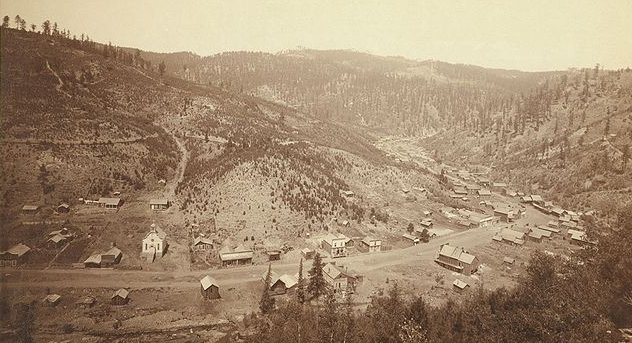 Galena, S. Dakota, 1890
Galena, S. Dakota, 1890
Just over a year ago Janet at Dear Author noted "Jane’s observation in her 2011 RWA wrap-up that small towns remain very popular" and added that
I think we’ve all read those small town books in which the heroine seemingly inexplicably throws off the chains of her ambitious career and chic urbanity for the SAHW+M role, with the small town world idealized to the point where the heroine’s motives for choosing that life apparently don’t need to be carefully considered and explained to the reader.
Of course, since Janet is an academic, she proceeded to consider this type of plot carefully, in order to come up with an explanation for its popularity and she suggested that in many small-town romances
the heroine submits to a new life, which is often undertaken with great reluctance or even active resistance, and which strips her of many of the previous responsibilities and choices she previously had. It’s a submission fantasy of another type, more emotional than sexual.
There's definitely evidence which would support this interpretation but I wonder if this plot could be considered a manifestation of what one American cultural historian, Richard Slotkin, has termed
The Myth of the Frontier [...] our oldest and most characteristic myth, expressed in a body of literature, folklore, ritual, historiography, and polemics produced over a period of three centuries. [...] In America, all the political, social, and economic transformations attendant on modernization began with outward movement, physical separation from the originating "metropolis." The achievement of "progress" was therefore inevitably associated with territorial expansion and colored by the experience, the politics, and the peculiar psychology of emigration. (10-11)
Life for those who emigrated to the frontier wasn't simple and, as Janet points out,
while the heroine’s life simplifies in some ways once she moves into the small town environment, it becomes more complicated in others. Often, the other ways involve a developing romantic relationship.
The complications and hard work required on the frontier are, however, associated with the "achievement of 'progress'" and heroines who go to live in a small town do achieve "progress" in their emotional lives once they have physically separated themselves from their "originating 'metropolis'."
-----
Janet. "The Enduring Appeal of the Small Town Romance." Dear Author 8 Nov. 2011.
Slotkin, Richard. Gunfighter Nation: The Myth of the Frontier in Twentieth-Century America. 1992. New York: HarperPerennial, 1993.
The image is a slightly cropped version of a "Bird's-eye view of a small town (main street and buildings) surrounded by hills." The small town in question is Galena, S. Dakota, in 1890. According to Wikipedia, where I found it, it is now out of copyright. It originally came from the John C. H. Grabill Collection at the Library of Congress.

Many Americans idolize small
Many Americans idolize small town America as the "real" America in spite of all the reality to the contrary. The small town and the myth of the "simple life" trope is a very common response to modernity and has been popular since the industrial revolution started distancing people from a sense of community.
It certainly goes back a long
It certainly goes back a long way. Apparently "One of the things that Jefferson is most associated with is his belief in the virtuousness of rural life and the converse dislike of city dwelling" (Johnson 720).
Jack Nachbar and Kevin Lause's Popular Culture: An Introductory Text lists various American "myths" including the one you describe: "True American virtue and happiness are to be found by living close to nature on a farm or in a small town" (96). Later in the same volume William Severini Kowinski writes that
I suppose it could be seen as a variation on various ideals of bucolic harmony and natural living (such as the classical utopian vision of Arcadia) but it does seem to have been adapted and taken to heart in the US in a form which makes it uniquely American.
-----
Johnson, Jeffrey K. "The Countryside Triumphant: Jefferson's Ideal of Rural Superiority in Modern Superhero Mythology." Journal of Popular Culture 43.4 (2010): 720–737.